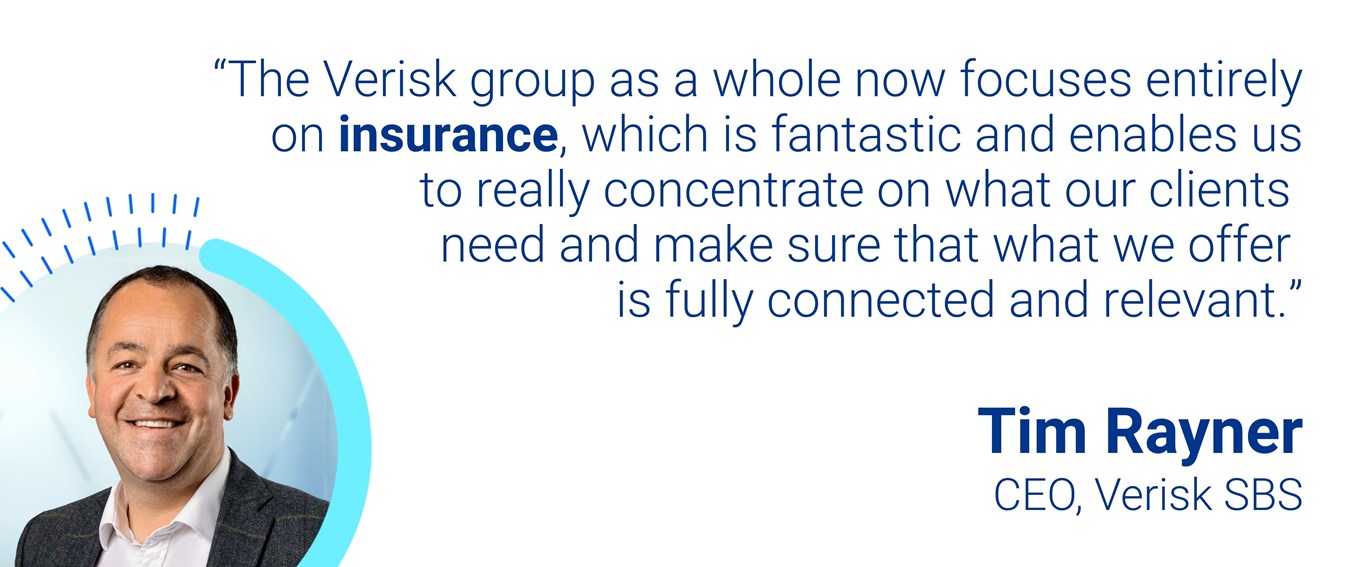The Broker’s Advantage in a Digital Future
Blog -- 05 October 2025
Author: Tim Rayner

The Broker’s Advantage in a Digital Future
Tim Rayner, CEO and President, Verisk Specialty Business Solutions
Brokers have always been at the center of insurance: trusted advisors, connectors of risk and capital, and advocates for clients navigating uncertainty. Their value has never been simply transactional. Brokers bring expertise, relationships, and judgment to help clients understand risk and secure the protection they need. As the global risk landscape grows more complex, this role is not diminishing; it is becoming more critical than ever.
Having spent nearly two decades on the broker side of the London Market, I know the pressures that come with placement cycles, client advocacy, and market negotiation. Those experiences gave me a lasting appreciation for how indispensable brokers are to making the system work. They also showed me the frictions that can hold brokers back, and why modernization matters.
Technology as an Enabler, Not a Substitute
Digital platforms and ecosystems are not here to replace brokers or underwriters. They are here to remove barriers that stand between them and their clients. Automation streamlines routine workflows. Structured data sharpens negotiations. Analytics provide deeper insights. Together, these tools reduce friction and free brokers to focus on advocacy, strategy, and value creation. Technology is most powerful when it amplifies human expertise and relationships, not when it seeks to substitute them.
Brokers as Global Connectors
Risk today rarely respects borders. Brokers link local expertise with international capital, enabling clients to navigate exposures that ripple across geographies. Digital ecosystems strengthen this advantage by making information more fluid, transparent, and comparable across markets. The ability to operate seamlessly on a global stage, while maintaining deep local knowledge, is one of the broker’s greatest strengths. With the right tools, this strength only grows more effective.
Turning Data Into Strategic Advantage
Data and analytics are transforming insurance, and brokers are uniquely positioned to harness them for clients. Catastrophe models, for example, have become a common language for evaluating exposure and capital deployment. When embedded into broker workflows, models and analytics help translate complexity into clarity, guiding clients toward more sustainable decisions. Increasingly, brokers are evolving from placement specialists into data-driven consultants, bringing sharper insights and innovative solutions to the table.
The Human Foundation
Insurance has always been, and will remain, a relationship business. Clients trust brokers not only for their technical knowledge but also for their advocacy and judgment. Digitalization strengthens this foundation by creating more transparent environments, improving the quality of submissions, and enabling faster collaboration. Underwriters benefit from richer data, brokers gain efficiency and focus, and ultimately clients see stronger outcomes from tailored coverage to quicker resolution when losses occur.
The Future of Broking
The broker’s role is not defined by process; it is defined by purpose. That purpose, connecting clients with the protection they need, is only becoming more important as risks grow more complex and interconnected. The future of broking will be shaped by those who combine human expertise with digital tools to deliver clarity, confidence, and resilience at scale.
My time in broking taught me that the market works best when brokers are empowered to do what they do best. At Verisk, we share that commitment. Through Whitespace, we are building a global marketplace designed to reduce friction, strengthen collaboration, and give brokers sharper tools to connect, advise, and advocate with greater impact across markets worldwide.
"Technology as an Enabler, Not a Substitute. Digital platforms and ecosystems are not here to replace brokers or underwriters. They are here to remove barriers that stand between them and their clients. Automation streamlines routine workflows. Structured data sharpens negotiations. Analytics provide deeper insights. Together, these tools reduce friction and free brokers to focus on advocacy, strategy, and value creation. Technology is most powerful when it amplifies human expertise and relationships, not when it seeks to substitute them."
Read Next
- 24 November 2025 - Blog Beyond the spreadsheet: How actuaries can stay indispensable in the age of AI pricing
- 22 October 2025 - Blog Tim Rayner reflects on three years as CEO of Verisk SBS
- 20 October 2025 - Blog Cyber pricing’s credibility gap: Why models lack reality and what needs to change
- 05 October 2025 - Blog The Broker’s Advantage in a Digital Future